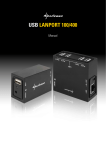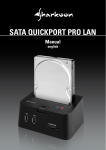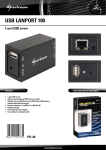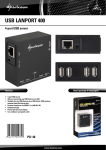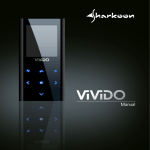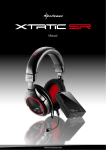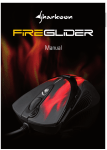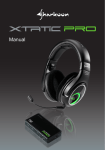Download Sharkoon USB LANPORT 400 Specifications
Transcript
ENGLISH USB LANPORT 100 / 400 Manual english USB LANPORT 100 / 400 1. Features 2. Parts and accessories 3. The device at a glance 4. Getting started 4.1 Hardware installation 4.2 Software installation (Windows for example) 5. The user interface 5.1 The user interface’s menu bar 5.1.1 The File menu 5.1.1.1 The Setting submenu 5.1.1.2 Exiting the program (Quit entry) 5.1.2 The View menu 5.1.3 The Help menu 5.2 The context menus 5.2.1 The USB server context menu 5.2.1.1 Backup Firmware 5.2.1.2 Update Firmware 5.2.1.3 Change Password 5.2.1.4 Restart Server 5.2.2 The USB devices context menu 6. Configuration via web interface 6.1 Device Status 6.2 Network 6.3 Reset device 6.4 Factory Default 6.5 Firmware Update 6.6 Password Change 7. Important notes 8. Example of use (Windows XP) USB LANPORT 100 / 400 ENGLISH Content Dear customer! Have a good time with our product! SHARKOON Technologies GmbH 1. Features • • • • • • • 1-port (USB LANPort 100) or 4-port (USB LANPort 400) USB server Allows connecting any USB device to a LAN Suitable for any USB devices (e.g. USB sticks, USB printers, external hard disk drives etc.) External interfaces (USB LANPort 100): 1x USB2.0, 1x LAN (RJ-45) External interfaces (USB LANPort 400): 4x USB2.0, 1x LAN (RJ-45) Compact design Power LED and reset button USB LANPORT 100 / 400 ENGLISH Congratulations for purchasing one premium quality SHARKOON product. For a long life time and to take full advantage of this product we recommend that you read this manual completely. ENGLISH 2. Parts and accessories A B C D • • • • USB LANPort (A) Power adapter (B) Patch cable (C) Tools CD incl. software and extensive manual (PDF / D) USB LANPORT 100 / 400 USB LANPort 100 B ENGLISH 3. The device at a glance USB LANPort 400 A C D A B E E D B A E A B D C D C E A B C D E – – – – – Network connector (RJ-45) Power connector (5 V / DC) Reset button Power LED USB connector(s) USB LANPORT 100 / 400 4.1 Hardware installation 1. 2. Connect the included patch cable to the USB LANPort’s network connector and an available network connector of your switch/hub/router/PC or similar. Connect the included power adapter to the USB LANPort and a wall outlet. The device will boot automatically. 4.2 Software installation (Windows for example) 1. 2. 3. 4. 5. Insert the included Tools CD into your CD/DVD drive. Use the Windows Explorer to open the directory of the inserted Tools CD. Double click (left mouse button) “Setup.exe”. The installation will start. Follow the installation wizard’s instructions. To complete the installation you will be prompted to reboot your PC. Confirm this indication. After successfully rebooting your system, the following icon will appear on your desktop: Double-click (left mouse button) this icon to launch the software. Note: You need to install this server software on every PC from which you want to access the USB LANPort. 6. Connect the USB device(s) to the USB port(s) of the USB LANPort. USB LANPORT 100 / 400 ENGLISH 4. Getting started First set the desired language for the user interface: File > Setting > Languages: A B D A – B – C – D – E – E C F Menu bar containing the entries “File“, “View“ and “Help“ USB server with appropriate IP address USB device attached to the USB server (for example a USB stick). Green icon = device available, red icon = device not available “Search“ button: by clicking (left mouse button) this button the search for devices connected to the USB server will be started “Config“ (configuration) button (only shown when the USB LANPORT 100 / 400 ENGLISH 5. The user interface USB server has been selected): left-click this button to open the USB server’s web interface “Connect“ button (only shown when an attached USB device has been selected): left-click this button to select the according USB device and to lock it for other users Note: The software will detect the connected USB server and associated devices automatically. Furthermore the USB server supports automatic and manual IP address assignment; automatic address assignment via DHCP is selected by default. In case your firewall prompts you during the installation process allow the USB server to access the respective network resources. 5.1 The user interface’s menu bar 5.1.1 The File menu The File menu offers the submenu “Setting“ and the entry “Quit“. 5.1.1.1 The Setting submenu The Setting submenu contains the entries “Polling Interval“ and „Receive Disconnect Request“ as well as the submenu “Languages“ USB LANPORT 100 / 400 ENGLISH F – 2. The “Polling Interval” entry: This entry lets you define whether and – if yes – in which interval the USB server will poll the status of the connected USB device(s). After selecting this menu entry the following window will open up: Enter “0” to deactivate this function. Enter any value > 20 seconds to activate this function and to set the interval. 3. The “Receive Disconnect Request” entry: In case a device is already in use by user A and user B wants to access this device simultaneously he can send the following request to B: USB LANPORT 100 / 400 ENGLISH 1. The “Languages submenu”: From the flip-out menu select the desired language for the user interface. ENGLISH The receipt of this automated request may be turned on/off here. 5.1.1.2 Exiting the program (Quit entry) Select this menu entry to quit the program. 5.1.2 The View menu The view menu offers the alternatively selectable entries “Servers And Devices“ and “Devices Only“. 1. The “Servers and Devices” entry: Select this option to display both the USB Server and connected USB devices in the user interface. 2. The “Devices Only” entry: If this option has been selected, the user interface will only show the attached USB devices. USB LANPORT 100 / 400 5.1.3 The help menu ENGLISH Via the “About“ entry you can access some program information. 5.2 The context menus By right-clicking the USB server entry or the devices entry in the user interface you can access the according context menus. The devices context menu differs depending on whether the device is available (green icon) or blocked (red icon). USB LANPORT 100 / 400 5.2.1 The USB server context menu ENGLISH A B C D E A – B – C – D – E – Enter a name for the USB server here DHCP on (manual IP address off) / DHCP off (manual IP address on) Define which port(s) shall be connected during program start-up automatically “Set“ saves your changes, “Cancel“ discards them The entries “Backup Firmware“, “Update Firmware“, “Change Password“ and “Restart Server“ USB LANPORT 100 / 400 5.2.1.1 Backup Firmware 5.2.1.2 Update Firmware In case you have a more actual version of the USB server’s firmware available you may update the current firmware version via this entry. With “Browse” you select the locally saved update version. “Submit” starts, “Cancel” terminates the update procedure. A current firmware version can be found at www.sharkoon.com. 5.2.1.3 Change Password In this input window (see below) you may assign a new password. This password is required to configure different settings of the USB server. USB LANPORT 100 / 400 ENGLISH The USB server offers the possibility to backup the firmware. The pop-up window (see below) already offers a target path for the backup file. Via “Browse” you can change this default path. “Submit” starts the backup, “Cancel” will terminate the action. ENGLISH 5.2.1.4 Restart Server Select this entry to restart the USB server. A restart may be necessary when the server does not react or other problems have occurred. You may also force a restart by pressing the reset button on the device. 5.2.2 The USB devices context menu 1. The details entry displays some information regarding the attached devices. USB LANPORT 100 / 400 This entry only appears when the device is blocked (red icon). 6. Configuration via web interface 1. 2. 3. Start the USB server software by double-clicking (left mouse button) the program icon. Start your browser. Enter the USB server’s IP address (without “http://” or “www” put in front) into the browser’s address line. The IP address assigned to the USB server can be found from the user interface of the USB server program: or from the USB server’s context menu: USB LANPORT 100 / 400 ENGLISH 2. The “Request Disconnect“ entry is used to send a message to the current user of a blocked device to ask him to unblock the device: Alternatively select the USB server’s entry from the user interface and click “Config“: 4. The browser will display the USB server’s web interface afterwards. USB LANPORT 100 / 400 ENGLISH ENGLISH 6.1 Device Status A B C A – B – C – Left-click the link to select the respective entry. This area displays various USB server information: Server Name, Manufacturer, Model, Firmware Version and Server Up-Time (time elapsed since server has been started). This area displays various information regarding the connected device: Device Name, Link Status, Device Status and Current User. USB LANPORT 100 / 400 ENGLISH 6.2 Network A B C D A – B – C – D – Left-click the link to select the respective entry. This area displays the current network status: IP Setting (automatic or manual IP address assignment), IP Address (IP address assigned to the server), Subnet Mask, MAC Address (the server’s MAC address). This area allows configuring the network settings. With “DHCP Setting” you define whether the network address shall be assigned automatically (Enable) or manually (Disable). The respective manual settings you enter into the areas “IP Address” and “Subnet Mask”. With “Server Name” you may define your own server name. To protect the server settings from unwanted changes you need to assign a “Password”. “Submit” saves your changes while “Clear” will discard them. USB LANPORT 100 / 400 ENGLISH 6.3 Reset device A B A – B – Left-click the link to select the respective entry. Perform a reset after entering the assigned password into the “Password” area and confirm by clicking the “Submit” button. 6.4 Factory Default A B A – B – Left-click the link to select the respective entry. To recover the factory default settings enter the password into the “Password” area and confirm by leftclicking the “Factory Default” button. USB LANPORT 100 / 400 ENGLISH 6.5 Firmware Update B C A – B – C – Left-click the link to select the respective entry. To perform a firmware update, download the respective software from our website and save it locally. Then enter the according password (see above) into the “Password” area and select the source path of the local update file with “Search”. “Submit” will confirm and start the update procedure. “Clear” cancels the action. 6.6 Password Change A B USB LANPORT 100 / 400 Left-click the link to select the respective entry. To change the current password enter it into the “Current Password” area, then enter the newly assigned password into the “New Password” area. Confirm the new password by re-typing it into the “Confirm New Password” area, Left-clicking “Submit” will complete this procedure. 7. Important notes 1. After you have successfully installed and configured the USB LANPort (as described above) connect any USB device to the USB plug(s) of the device. 2. You need to install the server software on every PC, from which you want to access the USB LANPort. 3. Your operating system will treat the connected USB device as if it was directly connected to the PC. This means that potential drivers (e.g. printer drivers) need to be installed on the system (for further details refer to the manuals of the according devices). 4. As the devices will be handled like directly attached hardware, we suggest to remove USB memory devices (USB sticks, external hard disk drives etc.) using the “Safely remove hardware” function before terminating the connection via “Disconnect”. The server software will also prompt you with the following note: USB LANPORT 100 / 400 ENGLISH A – B – ENGLISH Other USB devices such as printers, scanners etc. do not require this step and can directly be disconnected. 5. The USB to IP translation may cause a decrease in transfer speed compared to the native operation of the USB devices and is caused by technical means. 8. Example of use (Windows XP) User A at his desktop wants to access a USB stick that is directly connected to the USB LANPort. For this purpose he runs the server software which already has been installed on his system. The user interface of the server software will display the USB server and the associated device. The green icon indicates that the device is available (fig. 1). USB LANPORT 100 / 400 ENGLISH fig. 1 To access the device A selects it (1x left click) and then clicks (left mouse button) the “Connect” button. The operating system will install all required drivers and afterwards the USB stick will be shown as removable medium in the Windows Explorer (fig. 2). fig. 2 USB LANPORT 100 / 400 User B also wants to access the USB stick connected to the USB LANPort. He also runs the already installed server software. The user interface will display the USB server and the associated device. The red icon indicates that the device is currently in usage and is not available, the “Connect” button is set in grey (fig. 3). fig. 3 Using the devices context menu (fig. 4), B now can send a request (fig. 5) to A who is currently blocking the device. USB LANPORT 100 / 400 ENGLISH User A now has access to the USB stick and can use it as if connected directly to his PC. ENGLISH fig. 4 fig. 5 This request will be displayed on A’s screen. A can decide whether he agrees to release the device “Yes” or not “No”. As soon as A has released the device, B will receive the following prompt and can “Connect” to the device. USB LANPORT 100 / 400 ENGLISH When B does not need the device any longer he can cancel the connection via “Disconnect” and release the device for further usage. USB LANPORT 100 / 400 Legal disclaimer All named products and descriptions are trademarks and/or registered trademarks of the respective manufacturers and are accepted as protected. As a continuing policy of product improvement at SHARKOON, the design and specifications are subject to change without prior notice. National product specifications may vary. The legal rights of the enclosed software belong to the respective owner. Please observe the license terms of the manufacturer before using the software. All rights reserved especially (also in extracts) for translation, reprinting, reproduction by copying or other technical means. Infringements will lead to compensation. All rights reserved especially in case of assignation of patent or utility patent. Means of delivery and technical modifications reserved. © SHARKOON Technologies GmbH 2009 www.sharkoon.com USB LANPORT 100 / 400 ENGLISH Warning: For potential loss of data, especially due to inappropriate handling, SHARKOON assumes no liability.



























